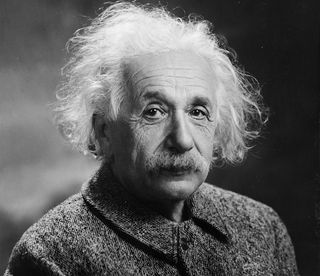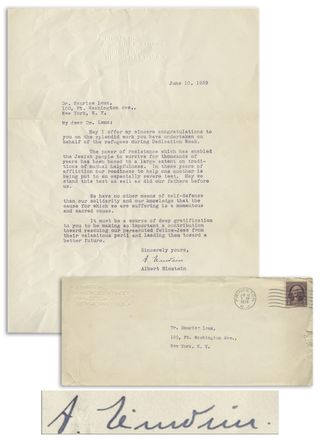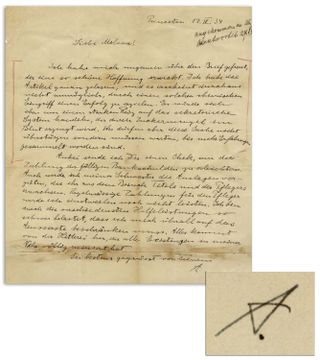Einstein's Letter Talking About 'Hitler-Insanity' to Be Auctioned

A handful of Albert Einstein's letters, including one in which he talks about the "Hitler-insanity" that had taken over Germany and also describes his son's schizophrenia treatments, are being auctioned off this week to the highest bidder.
Einstein was a prolific writer, and his letters have allowed historians to see what occupied his mind. As these letters show, Einstein thought about issues big and small, especially about how world events affected him and other people targeted by Nazi Germany.
For instance, in one of the letters being auctioned off, dated June 10, 1939, Einstein wrote to Maurice Lenz, a leader in the field of radiation therapy at Columbia University in New York City. But Einstein didn't discuss Lenz's research in the note. Rather, Einstein congratulated Lenz on his work benefiting Jewish refugees during World War II. [6 Ways Albert Einstein Fought for Civil Rights]
"The power of resistance which has enabled the Jewish people to survive for thousands of years has been based to a large extent on traditions of mutual helpfulness," Einstein wrote to his friend. "May we stand this test as well as did our fathers before us."

In another letter hitting the auction block, dated April 17, 1934, Einstein wrote to his ex-wife Mileva Marić about finances and their children. The couple had three kids, including Eduard ''Teitel'' Einstein, who was diagnosed with schizophrenia by age 20.
The letter, written in German, expresses hope that a chemical intervention might help treat Eduard. Einstein wrote that "I read the articles closely, and it does not seem completely impossible that a successful result might be obtained through a chemical intervention such as this. It would simply constitute a strong stimulus to the secretory system created by a deficiency of sugar within the blood."
Still, Einstein — ever the scientist — urged caution before trying the treatment, writing, "we should not rush into this thing, we must wait until more experience has been gained."
Sign up for the Live Science daily newsletter now
Get the world’s most fascinating discoveries delivered straight to your inbox.
He also discussed money he was sending to help Marić pay bank debts. But time and money were tight, he wrote, saying, "I am strained so severely by the various acts of assistance that I have to restrict myself all around in the most extreme way. All this is the result of the Hitler-insanity, which has completely ruined the lives of all those around me."

Even in 1921, Einstein could see that the Nazis were gaining power in Germany. In a letter to his sister, Maja Winteler-Einstein, that is also being auctioned, he wrote, "I am supposed to go to Munich, but I will not do that, because this would endanger my life right now."
Eight of Einstein's letters are currently up for grabs at the Nate D. Sanders Auctions in Los Angeles until 2 p.m. EDT/5 p.m. PDT on Friday, March 28.
- Image Gallery: Einstein's Brain
- Einstein Quiz: Test Your Knowledge of the Famous Genius
- Rare Artifacts from the History of Science Auction (Photos)
Originally published on Live Science.

Laura is the archaeology and Life's Little Mysteries editor at Live Science. She also reports on general science, including paleontology. Her work has appeared in The New York Times, Scholastic, Popular Science and Spectrum, a site on autism research. She has won multiple awards from the Society of Professional Journalists and the Washington Newspaper Publishers Association for her reporting at a weekly newspaper near Seattle. Laura holds a bachelor's degree in English literature and psychology from Washington University in St. Louis and a master's degree in science writing from NYU.
